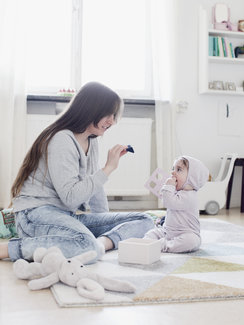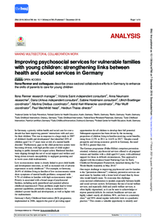

Displaying 171 - 180 of 423
This paper focuses on the longitudinal examination of perceived reactive attachment disorder (RAD) symptoms and indiscriminate, insecure and pseudomature behavior in foster children, many of them having experienced maltreatment and neglect in the family of origin.
This article from BMJ describes cross-sectoral collaborative efforts in Germany to enhance the skills of parents to care for young children.
The aim of this study was to examine changes in parental empowerment and child behavioural problems during a period of youth care and how changes are related to the kind of services provided.
For this study, ten multilevel meta-analyses were performed to examine factors that can affect instability of foster care placement.
The present study describes how two youth care organizations in the Netherlands implemented group climate monitoring instruments for children as part of the broader ‘You Matter!’ project, and aims to answer the question how these monitoring instruments can help to improve group climate when routinely embedded in daily care.
In this study, concept mapping was used to identify the needs of nonkinship foster parents from Caucasian ethnicity who care for unaccompanied refugee minors (URM) in Flanders (Dutch speaking part of Belgium).
On 15 November, care leavers and young people in Europe shared their recommendations with more than 60 representatives of governments, NGOs, youth welfare services and universities at the final project roundtable in Brussels.
The present study examined the effectiveness of Family Group Conferencing (FGC) in child welfare.
This paper focuses on youngsters’ experiences of continuity in relation to youth-care services.
On 7 November the leading liberal party in the Netherlands, the VVD (Volkspartij voor Vrijheid en Democratie), released a white paper proposal (‘initiatiefnota’) on measures to combat orphanage tourism.

